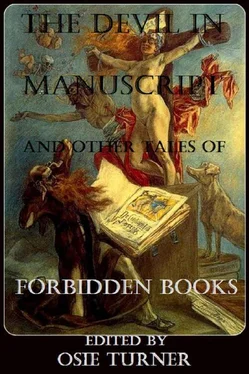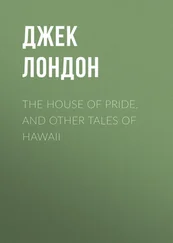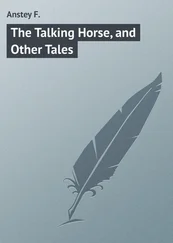A squeal from one of the falcons interrupted her, and she arose to adjust the longe which had become whipped about the bloc, but the bird still flapped its wings and screamed.
“What is the matter?” she said. “Philip, can you see?”
I looked around and at first saw nothing to cause the commotion, which was now heightened by the screams and flapping of all the birds. Then my eye fell upon the flat rock beside the stream from which the girl had risen. A grey serpent was moving slowly across the surface of the boulder, and the eyes in its flat triangular head sparkled like jet.
“A couleuvre,” she said quietly.
“It is harmless, is it not?” I asked.
She pointed to the black V-shaped figure on the neck.
“It is certain death,” she said; “it is a viper.”
We watched the reptile moving slowly over the smooth rock to where the sunlight fell in a broad warm patch.
I started forward to examine it, but she clung to my arm crying, “Don’t, Philip, I am afraid.”
“For me?”
“For you, Philip,—I love you.”
Then I took her in my arms and kissed her on the lips, but all I could say was: “Jeanne, Jeanne, Jeanne.” And as she lay trembling on my breast, something struck my foot in the grass below, but I did not heed it. Then again something struck my ankle, and a sharp pain shot through me. I looked into the sweet face of Jeanne d’Ys and kissed her, and with all my strength lifted her in my arms and flung her from me. Then bending, I tore the viper from my ankle and set my heel upon its head. I remember feeling weak and numb,—I remember falling to the ground. Through my slowly glazing eyes I saw Jeanne’s white face bending close to mine, and when the light in my eyes went out I still felt her arms about my neck, and her soft cheek against my drawn lips.
* * *
When I opened my eyes, I looked around in terror. Jeanne was gone. I saw the stream and the flat rock; I saw the crushed viper in the grass beside me, but the hawks and blocs had disappeared. I sprang to my feet. The garden, the fruit trees, the drawbridge and the walled court were gone. I stared stupidly at a heap of crumbling ruins, ivy-covered and grey, through which great trees had pushed their way. I crept forward, dragging my numbed foot, and as I moved, a falcon sailed from the tree-tops among the ruins, and soaring, mounting in narrowing circles, faded and vanished in the clouds above.
“Jeanne, Jeanne,” I cried, but my voice died on my lips, and I fell on my knees among the weeds. And as God willed it, I, not knowing, had fallen kneeling before a crumbling shrine carved in stone for our Mother of Sorrows. I saw the sad face of the Virgin wrought in the cold stone. I saw the cross and thorns at her feet, and beneath it I read:
“PRAY FOR THE SOUL OF THE
DEMOISELLE JEANNE D’Ys,
WHO DIED
IN HER YOUTH FOR LOVE OF
PHILIP, A STRANGER.
A.D. 1573.”
But upon the icy slab lay a woman’s glove still warm and fragrant.
“If but the Vine and Love Abjuring Band
Are in the Prophets’ Paradise to stand,
Alack, I doubt the Prophets’ Paradise,
Were empty as the hollow of one’s hand.”
THE STUDIO
He smiled, saying, “Seek her throughout the world.”
I said, “Why tell me of the world? My world is here, between these walls and the sheet of glass above; here among gilded flagons and dull jewelled arms, tarnished frames and canvasses, black chests and high-backed chairs, quaintly carved and stained in blue and gold.”
“For whom do you wait?” he said, and I answered, “When she comes I shall know her.”
On my hearth a tongue of flame whispered secrets to the whitening ashes. In the street below I heard footsteps, a voice, and a song.
“For whom then do you wait?” he said, and I answered, “I shall know her.”
Footsteps, a voice, and a song in the street below, and I knew the song but neither the steps nor the voice.
“Fool!” he cried, “the song is the same, the voice and steps have but changed with years!”
On the hearth a tongue of flame whispered above the whitening ashes: “Wait no more; they have passed, the steps and the voice in the street below.”
Then he smiled, saying, “For whom do you wait? Seek her throughout the world!”
I answered, “My world is here, between these walls and the sheet of glass above; here among gilded flagons and dull jewelled arms, tarnished frames and canvasses, black chests and high-backed chairs, quaintly carved and stained in blue and gold.”
THE PHANTOM
The Phantom of the Past would go no further.
“If it is true,” she sighed, “that you find in me a friend, let us turn back together. You will forget, here, under the summer sky.”
I held her close, pleading, caressing; I seized her, white with anger, but she resisted.
“If it is true,” she sighed, “that you find in me a friend, let us turn back together.”
The Phantom of the Past would go no further.
THE SACRIFICE
I went into a field of flowers, whose petals are whiter than snow and whose hearts are pure gold.
Far afield a woman cried, “I have killed him I loved!” and from a jar she poured blood upon the flowers whose petals are whiter than snow and whose hearts are pure gold.
Far afield I followed, and on the jar I read a thousand names, while from within the fresh blood bubbled to the brim.
“I have killed him I loved!” she cried. “The world’s athirst; now let it drink!” She passed, and far afield I watched her pouring blood upon the flowers whose petals are whiter than snow and whose hearts are pure gold.
DESTINY
I came to the bridge which few may pass.
“Pass!” cried the keeper, but I laughed, saying, “There is time;” and he smiled and shut the gates.
To the bridge which few may pass came young and old. All were refused. Idly I stood and counted them, until, wearied of their noise and lamentations, I came again to the bridge which few may pass.
Those in the throng about the gates shrieked out, “He comes too late!” But I laughed, saying, “There is time.”
“Pass!” cried the keeper as I entered; then smiled and shut the gates.
THE THRONG
There, where the throng was thickest in the street, I stood with Pierrot. All eyes were turned on me.
“What are they laughing at?” I asked, but he grinned, dusting the chalk from my black cloak. “I cannot see; it must be something droll, perhaps an honest thief!”
All eyes were turned on me.
“He has robbed you of your purse!” they laughed.
“My purse!” I cried; “Pierrot—help! it is a thief!”
They laughed: “He has robbed you of your purse!”
Then Truth stepped out, holding a mirror. “If he is an honest thief,” cried Truth, “Pierrot shall find him with this mirror!” but he only grinned, dusting the chalk from my black cloak.
“You see,” he said, “Truth is an honest thief, she brings you back your mirror.”
All eyes were turned on me.
“Arrest Truth!” I cried, forgetting it was not a mirror but a purse I lost, standing with Pierrot, there, where the throng was thickest in the street.
THE JESTER
“Was she fair?” I asked, but he only chuckled, listening to the bells jingling on his cap.
“Stabbed,” he tittered. “Think of the long journey, the days of peril, the dreadful nights! Think how he wandered, for her sake, year after year, through hostile lands, yearning for kith and kin, yearning for her!”
Читать дальше












